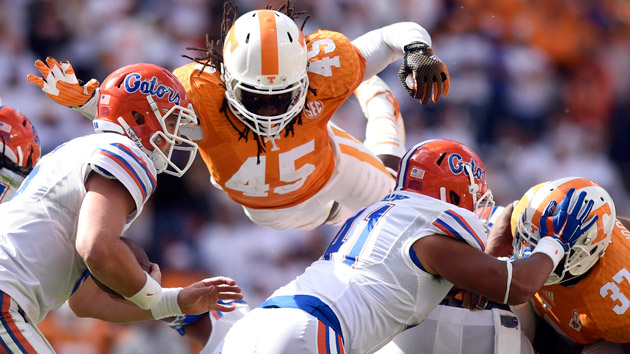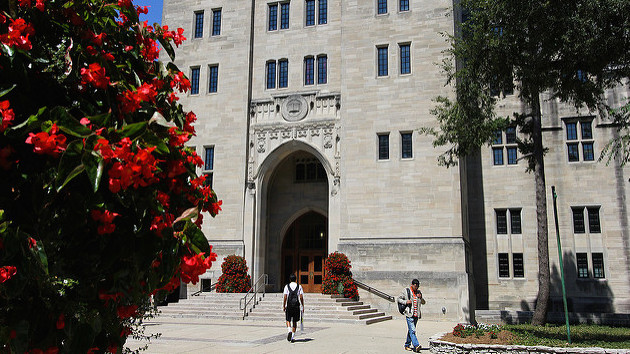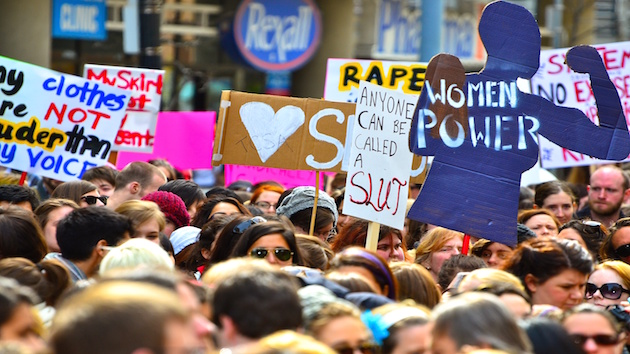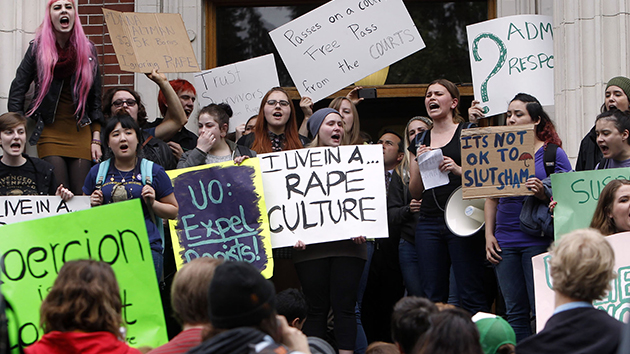
A.J. Johnson, above, is one of seven athletes at the center of a civil rights lawsuit against the University of Tennessee-Knoxville.Adam Lau/The Knoxville News Sentinel/AP
Update 7/5/16, 7:40 p.m.: The University of Tennessee-Knoxville on Tuesday settled the civil rights lawsuit brought by eight women over the school’s handling of sexual-assault cases involving student-athletes. As part of the settlement, first reported by the Tennessean, the university did not admit to wrongdoing and agreed to pay $2.48 million to the plaintiffs, as well as establish an independent commission to review responses to sexual-assault cases at schools throughout the University of Tennessee system. UT also stated it would hire six positions in its Title IX office and to cease referring student-athletes who are accused of misconduct to a list of Knoxville attorneys. In response, two plaintiffs will withdraw federal Title IX complaints against the university, according to the Tennessean.
A massive civil rights lawsuit is pitting the University of Tennessee-Knoxville and its $120 million athletics program against a group of unlikely challengers: eight college women, all of whom say they were victimized by some of the school’s highest-profile athletes.
For the last month, the university has faced renewed scrutiny over its handling of sexual-assault cases involving student-athletes. On February 9, six women filed a 64-page federal lawsuit against the university, alleging the institution improperly handles women’s sexual-assault cases and condones an athletic culture that encourages underage drinking, drug use, and sexual violence. The women, all former students, also say the university did little to protect the students who accused football and basketball players of sexual assault or related misconduct.
On February 24, two more women joined the lawsuit. Now, the women’s attorneys allege that, during the university’s initial investigations, six athletes in the complaint were found to have committed sexual assaults but were allowed to stay in school, according to a new court filing released Tuesday. One of the women alleges that football player Alexis Johnson physically assaulted her for refusing to have sex just over two weeks ago. Johnson was arrested on February 17 on charges of aggravated assault and false imprisonment, and he pleaded not guilty at his arraignment March 1.
The new plaintiff says that last spring, Lavon “Von” Pearson—also on the football team—raped her in his apartment. According to the complaint, the University of Tennessee found that Pearson “engaged in sexual conduct with plaintiff without her consent,” and it suspended him, leading Pearson to ask for a formal administrative hearing. After the Knox County district attorney declined to file charges, however, the suspension was lifted and Pearson was reinstated to the football team. The woman, according to the complaint, decided to drop out of UT.
The lawsuit outlines a roughly 20-year history of alleged sexual and criminal misconduct among male football and basketball players, including a 1996 case involving Broncos quarterback Peyton Manning. But the lawsuit focuses on a cluster of incidents involving athletes that occurred between 2013 and 2016.
The university, which called the allegations in the lawsuit “false,” flatly denies that its procedures create hurdles for sexual-assault victims or makes them less safe. “To claim that we have allowed a culture to exist contrary to our institutional commitment to providing a safe environment for our students or that we do not support those who report sexual assault is just false,” wrote William Ramsey, an attorney representing the university.
Meanwhile, the alleged sexual-harassment incident involving Manning stirred renewed interest last month. Both the Daily Beast and New York Daily News columnist Shaun King revisited an incident involving Manning and Jamie Naughright, who worked as an athletic trainer at UT. King unearthed a court document from a 2002 defamation lawsuit against Manning as well as his father, Archie, ghostwriter John Underwood, and publisher Harper Collins over a reference to Naughright in their book Manning.
The document describes an incident from 1996, in which Naughright was examining Peyton Manning’s foot. What happened next depends on whether you ask Naughright or Manning: Naughright said Manning dropped his pants and sat on her face, while Manning said he mooned a teammate while Naughright was around. The Washington Post reported that the defamation case was later settled, and the documents that had been sealed or redacted were returned to the lawyers on both sides. (On February 23, the university’s attorneys filed a motion to get rid of the reference to Manning’s alleged incident from the complaint, arguing that it isn’t relevant to the women’s case and that it’s “immaterial, impertinent, and scandalous.” A federal judge has yet to rule on it.)
In the case involving the eight UT women, the plaintiffs have argued the judge should temporarily stop the university from using its administrative hearing process to review sexual-assault allegations, including in a pending case that involves one of the plaintiffs. A federal judge denied that request on February 16 and ruled that the women’s attorneys failed to show how the university’s administrative hearings would cause harm to alleged sex-assault victims.
Just last week, all 16 head coaches from UT’s athletic program held a joint press conference to defend the department’s culture. Butch Jones, head coach of the UT football program, insisted no culture problem existed in his program and said, “Our hearts, our thoughts and our prayers go out to the alleged victims. We feel for them. We are constantly educating our players. We are constantly trying to prevent anything like this from happening. That’s our role as coaches. That’s our role as parents.”
Here’s what you need to know about the case:
What are the allegations? According to the complaint, coaches and university officials created a culture of sexual violence at on- and off-campus parties and in athlete dorms, in which officials were aware of underage drinking, drug use, and alleged assaults.
The complaint alleges athletes knew that even if they were accused of sexual assault, the university and athletic department would connect them with a lawyer and encourage them to request a formal administrative hearing. (Ramsey, the university’s lawyer, told Mother Jones the idea that the university arranged legal aid for athletes was “false.”) By opting into this hearing, the complaint says, athletes could delay any punishment until they finished their seasons, transferred to other schools, or graduated. The lawsuit also alleges university officials were warned of institutional problems with handling sexual-assault cases involving athletes—and failed to intervene.
Of the seven alleged sexual assaults at the heart of the lawsuit, six were reported to law enforcement, according to the complaint and the plaintiffs’ attorney. Authorities filed charges in two cases: that of A.J. Johnson and Michael Williams, who allegedly raped a sophomore student-athlete in November 2014, and that of Alexis Johnson, who allegedly physically assaulted a student on February 14. (Johnson and Williams are awaiting trial.) A Knoxville police department spokesperson told Mother Jones that the case involving Riyahd Jones, one of the student-athletes facing accusations, was closed after the alleged victim chose not to pursue charges.
Ramsey told Mother Jones the university’s legal team declined to comment further about specific allegations in the lawsuit. “We will save that for our pleadings in court,” he said.
What about other recent incidents involving student-athletes and allegations of sexual assault? How is this different? The questions about how UT handles alleged sexual assaults involving athletes is the latest in a trail of cases involving current and former college athletes across the country.
The allegations in this case are reminiscent of those raised by Erica Kinsman, a former student at Florida State University who was allegedly attacked in 2012 by former star quarterback Jameis Winston at an off-campus apartment in Tallahassee. Kinsman filed a federal complaint alleging that the university did not investigate the reported rape and acted “deliberately indifferent.”
Florida State settled the case with Kinsman in January for $950,000. As part of the settlement, the university did not admit to liability and agreed to enhance and expand sexual-assault awareness programs for five years. The university’s president, John Thrasher, said in a statement that the university denied any misconduct and paid the settlement to avoid legal expenses. He also laid out efforts the university had taken to address sexual assaults on campus.
While the civil lawsuit ended, an ongoing Title IX probe investigating how the university handles sexual-assault cases remains open. Florida State is one of at least 160 universities currently under investigation by the Department of Education’s Office of Civil Rights.
Last June, the University of Tennessee joined that list, when the Office of Civil Rights launched its probe on the university. (Attorneys for the six women confirmed that two of them had filed a Title IX complaint to the office.)
Most recently, Baylor University has come under fire for its handling of sexual-assault cases. University president and chancellor Ken Starr released a comprehensive outline of how the private Christian university addresses such cases. The letter, released on February 7, followed accusations from alleged sexual-assault victims, uncovered by ESPN’s Outside the Lines, that the school failed to properly examine allegations and did not offer support to victims.
In late August, Samuel Ukwuachu, a defensive end at Baylor University, was found guilty of sexually assaulting a student, almost two years after the incident occurred. Texas Monthly reported at the time that the university did not take disciplinary action against the athlete after its own investigation, even though formal criminal charges against him were pending.
When asked about the Outside the Lines report and Samuel Ukwuachu, a Baylor spokesperson told Mother Jones: “Incidents and reports of interpersonal violence on our campus contradict everything we believe on a human level and as a Christian institution. Our Title IX Office is committed to responding quickly, compassionately, and appropriately to reports of interpersonal violence by students or third-party reporters.” On February 12, the university announced that its board of regents had approved changes to address sexual assaults on campus, including by hiring counselors and mandating annual training for most students, faculty, and staff.
Why does the law allow alleged victims to sue universities? If the university administration had been aware of serious risk of sexual misconduct but failed to address it, then the school could be held responsible for the sexual assaults that occurred on campus under Title IX, which protects students from gender-based discrimination.
The plaintiffs’ attorneys told Mother Jones that the precedent for their case lies with a federal appeals court decision in 2007 against the University of Colorado-Boulder. The court ruled that the university had condoned a team policy that allowed players to show prospective high school athletes a “good time” during recruiting. The school’s failure to properly supervise the program’s players allowed the sexual assaults to occur. “[T]he likelihood of such misconduct was so obvious that CU’s failure was the result of deliberate indifference,” the appeals court found. (The University of Colorado later settled with the plaintiffs Lisa Simpson and Anne Gilmore for $2.85 million after the ruling.) Bloomberg reported at the time that the university did not admit liability in the settlement.
In UT’s case, the plaintiffs allege the university administration, athletic department, and football coaches, including head coach Butch Jones, were aware and notified of past sexual assaults, “acted with deliberate indifference” to the risks of those assaults, and “failed to take corrective actions.”
According to the complaint, the university failed to disclose several allegations of sexual assault by football players and were aware of concerns from within. For two years, Tim Rogers, a former vice chancellor who oversaw sexual-assault investigations, made “repeated efforts” to raise concerns to university administrators of persistent sexual misconduct from athletes and, according to a memo in the complaint, accused the athletic department of exerting influence over student discipline. Rogers left the university in March 2013, criticizing the “intolerable situation” surrounding the university’s disciplinary process.
Jenny Wright, who was director of student judicial affairs at the time, also voiced concerns over what the complaint describes as the athletic department’s “active interference” in disciplinary proceedings. The lawsuit says Chancellor Jimmy Cheek allegedly told Wright not to pursue disciplinary action against former football player Marlin Lane, who was accused of sexual assault in April 2013. Wright, the complaint says, was criticized by the athletic department for her investigations and was verbally berated by the athletic director and vice chancellor, Dave Hart, who joined Tennessee after 13 years at Florida State University.
When asked about the allegations, Ramsey reiterated that the university and athletic department “acted properly in the situations identified in the lawsuit.”
In July 2013, two months after Rogers’ departure, the university commissioned a review of its Office of Student Judicial Affairs, which oversees student misconduct, a university spokesperson told Mother Jones. The resulting report from university staff and outside experts, provided to Mother Jones, found that the office’s process for pursuing disciplinary action mimicked a “trial” in a way that was “very intimidating for both the students and witnesses who participate.” It also noted that the office’s associate director at the time received “very little training” regarding Title IX. The report did not specifically mention the university’s process for investigating reports of sexual assault. “We have implemented most of the recommendations in the report,” the university spokesperson told Mother Jones.
What will be a big issue in the case? Unlike most universities, the lawsuit alleges, the UT system allows students who are accused of sexual assaults to request a hearing under the state’s Uniform Administrative Procedures Act (TUAPA), which grants them the right to contest disciplinary action. If an accused student invokes this kind of hearing, which is more formal than a typical campus hearing and takes place in front of an administrative judge, he or she is given the right to legal counsel and the right to cross-examine the accuser.
The complaint alleges that by allowing accused students to invoke the state law, the university is violating the federal government’s guidance for how campuses should handle sexual assault and that the process works in their favor. A letter from the Education Department’s Office for Civil Rights “strongly discourages” schools from allowing parties to cross-examine one another and notes that questions should be asked through an independent party: “Allowing an alleged perpetrator to question an alleged victim directly may be traumatic or intimidating.”
According to the plaintiffs, the TUAPA process also allows the accused athletes to delay disciplinary action, even though federal guidance says typical sexual-assault investigations should take about 60 days to resolve. In the case of former Tennessee basketball player Yemi Makanjuola, in March 2013, the university found that he had violated the school’s conduct policy a month after a student reported to authorities she had been sexually assaulted. Then, Makanjuola’s attorney Don Bosch, a former UT athlete who sits on the university’s board of athletics, requested an administrative hearing to fight the charges. After the season was over, Makanjuola transferred to the University of North Carolina-Wilmington without participating in the hearing. Still, the student who accused Makanjuola of rape testified before a judge and was questioned by UT’s attorney and the administrative law judge about the incident.
“None of that is in Title IX. You’re not supposed to have that,” said David Randolph Smith, one of the women’s attorneys. “You’re supposed to protect these victims and do it in the least burdensome way consistent with due process.”
The university’s attorney says school policy grants all students the right to a hearing under the Administrative Procedures Act. “There are no special arrangements given [to] student athletes by either Student Conduct or the Criminal Justice System,” Ramsey told Mother Jones.
How could this case affect other schools? The case aims to change the way those accused of sexual assault at UT can battle those allegations using the state’s Administrative Procedures Act. The women say the university’s current system fails to provide equal rights when this state law is used to conduct hearings, and that it’s harmful in a way that’s unique among universities in the United States.
Brett Sokolow, founder of the National Center for Higher Education Risk Management and a consultant for the plaintiffs, adds that the Tennessee lawsuit “has the potential to call attention to insufficient discipline of athletes” and could “put other universities on warning that they need to be taking this misconduct seriously and treating it as a culture and climate issue.”
However, Title IX expert Erin Buzuvis says it would take more than a lawsuit to take on the deeper cultural issues within an institution, particularly in how programs address sexual-assault cases involving student athletes.
“We have a double standard for football when it comes to academic integrity. We have a double standard for football when it comes to player safety and concussions. We have a double standard for football when it comes to sexual misconduct,” said Buzuvis, a professor at Western New England University School of Law. “It’s the pedestal upon which we’ve placed football that is underscoring the pattern here.” (In response, a UT spokesperson told Mother Jones that a double standard doesn’t exist at the school, adding that the student disciplinary process applied to all students.)
“Until that’s addressed, I think it’s naive to think any one case is going to start a ripple effect of behavior change,” Buzuvis adds.


















